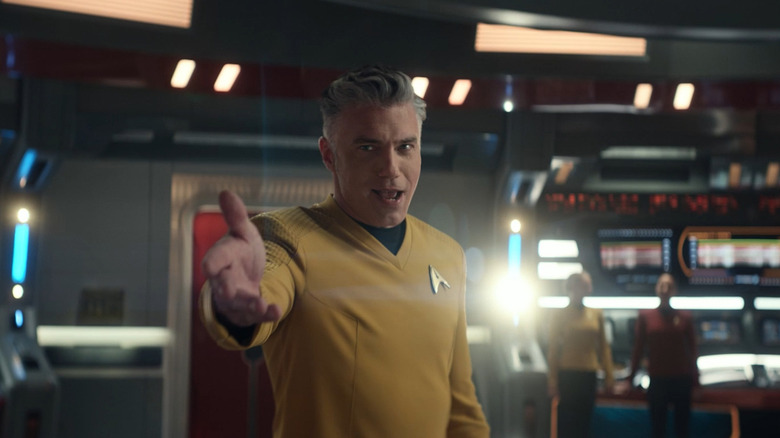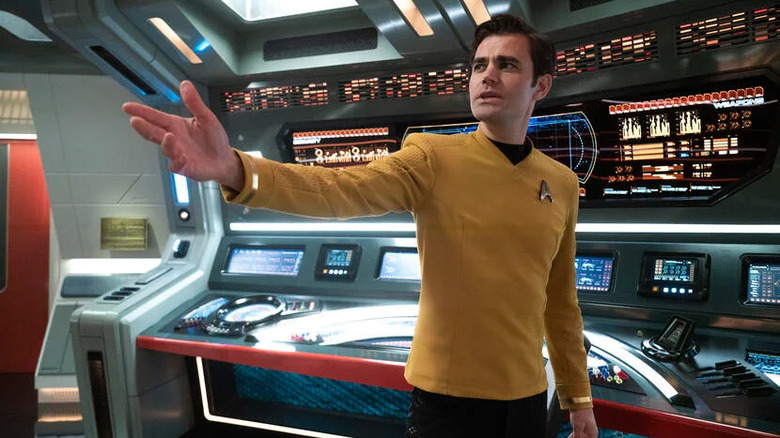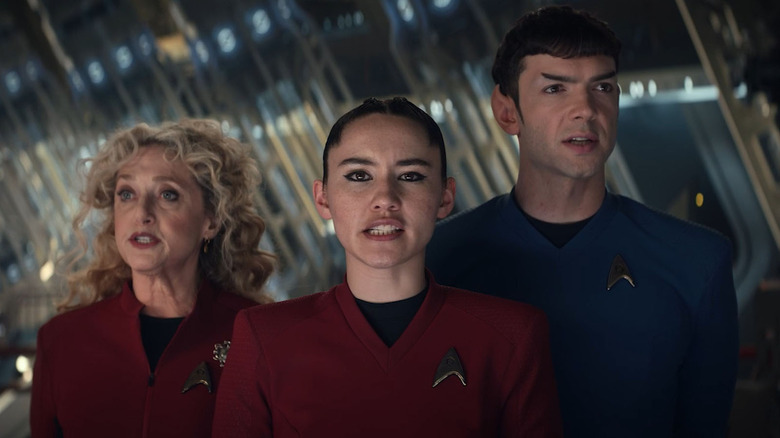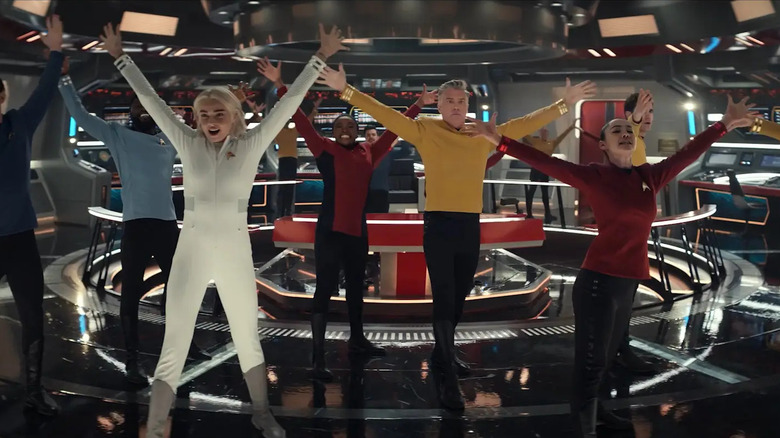Star Trek: Strange New Worlds Musical Episode Director On Staging Songs In The Key Of Enterprise [Exclusive Interview]
The funny thing about "Subspace Rhapsody," the musical episode of "Star Trek: Strange New Worlds," is that it's still ... well, it's still a "Star Trek" episode. Yes, everyone is bursting into song and dancing through the corridors of the starship Enterprise, but it's because the crew accidentally triggers a subspace anomaly that causes a dimensional rift with unexpected consequences. In this case, it causes everyone to express themselves through song. Whoops. And naturally, it's up to Captain Pike and his crew to fix the space problem they caused before it can transform their entire universe.
Director Dermott Downs proves himself to be the perfect fit for the material. With credits that include "Arrow," "Supergirl," "Doom Patrol," and "Chucky," Downs is no stranger to geek-flavored television. But it's his work on the acclaimed "The Flash" episode "Duet," in which the title character finds himself trapped in a musical dimension, that surely landed him the "Strange New Worlds" gig. The episode walks a fine line (it's ridiculous, but it's still checking every box you'd want from a "Star Trek" adventure), and it's one that Downs manages to pull off.
I recently spoke with Downs over Zoom about his work on the episode, the actor who seemed the most nervous to sing, directing Spock in a musical number, and staging that big final number.
Note: This interview has been lightly edited for clarity and brevity.
'What's amazing with Strange New Worlds is how grounded ... that show is'
Let's start with the basics. Why you? Why were you picked for the "Star Trek" musical episode?
I had a meeting with [Alex Kurtzman's production company] Secret Hideout, and first of all, the first season of "Strange New Worlds" hadn't even aired yet, and I was like, "Look, I mean, ["Star Trek" shows are] all good, but why another one?" I said, "What was so fascinating about the original was every week you'd just sort of be something completely different. You could be the tribble comedy, you could be in an interracial romance, you could be a courtroom drama." And they were like, "That's exactly what we're doing with this." They said, "And we have two episodes open. We have a sitcom and we have a musical." They don't hire directors to do blocks because every episode is so uniquely different. They really want to find the right person. And I had done a musical "Flash" and "Supergirl" episode called "Duets," in which the alternate Earth was kind of a weird Bugsy Malone '50s gangster world.
Not to blow my own horn, but Vanity Fair did a really flattering review and called it quite possibly the best hour of musical television ever produced. I had done some other music-influenced episodes of "Prodigal Son" and I had come of age as a cinematographer when MTV was really making music videos. So I was making three to four minute movies set to music almost once a week for quite a few years. We met, we talked about it. Obviously Bill [Wolkoff] and Dana [Horgan] wrote a great script and they took a swing with me and I'm so happy. It's a career highlight.
What was the big thing you learned from your "Flash" episode? The thing that made you say, "Yeah, we've got to make sure we do this in 'Star Trek,'" or "We've got to make sure we don't do this"?
"Flash" wasn't ... I mean, it was grounded and they were trying to get out of this world they're stuck in, but everything's sort of a little heightened in the DC world. What's amazing with "Strange New Worlds" is how grounded — even though you're in outer space and going to strange new worlds every week — is how grounded that show is. I think it's paramount to what Akiva [Goldsman] and Henry [Alonso Myers] were setting out to do. I guess the biggest takeaway I had learned was just how prepared you need to be. I mean, ["Flash"] was an eight-day episode with probably half the money, so every minute counts — not that it didn't on twice the budget and almost twice the days, but really getting the actors familiar with their songs. Because when I came on board, music was temp recorded with the other singers.
As I was imagining choreography for the two weeks I was on before my regular prep started, I was with the choreographer walking the stages, just trying to get a ... really wanting to differentiate each song from the next in how the characters moved and how we were going to have the camera visualize it differently. I had certainly learned the stakes in one hour TV with "Flash," but this was its own animal and I was looking to sort of make it its own, so I wasn't looking to really repeat "Flash." But coming from music videos, I had worked with actors that were appearing in music videos. We were working with non-actors because the singers wanted to play the parts in their videos and go in and out of narrative to song, so I had quite a bit of experience doing that, good or bad. I hope good, in everybody's eyes that sees it.
'The music was exposition, but it wasn't just sort of blatant exposition, it was kind of character exposition'
This episode reminded me a lot of the rightfully famous musical episode of "Buffy the Vampire Slayer," because what the episode did right was that it didn't just lean on the music as a gimmick. It uses music as a way to propel every storyline, to let the characters say things that could not be said previously.
In a way, the music was exposition, but it wasn't just sort of blatant exposition, it was kind of character exposition. Because as you noted, yes, music becomes a way of saying things that they can't say. And in exposing your deeper vulnerabilities through song that you're compelled to, that you have no choice but to embrace because it's an infection that's taken over the ship, once you go with that conceit, everybody, I believe, was just game to embrace it. Because none of it was like, yeah, jazz hands, and I mean, it climaxes is in a big chorus line, but we're coming together as one because this is the only way we're going to beat this.
But there's private moments where La'an, in her quarters, it's a solo to herself, and the heartbreak of not being able to express love. Captain Pike, [Anson Mount's] kind of country duet gone off the wires. It's humiliating to be saying these things in front of everybody, but yet he's forced to, and he even gets down on his knees to profess his love. The whimsy of Rebecca [Romijn] and Paul [Wesley] in the hallway first kind of feeling, "Oh, wow, what is this? We're not fighting it." It was so nuanced in the way it begins and how it builds through the ship to the finale where you've got them and the Klingons in a battle of the bands, which was, yeah, a pinnacle.
I'm kind of obsessed with how Ethan Peck performs Spock singing, because clearly he's not Ethan Peck singing. It is Spock singing. It's a very specific choice. Can you talk about directing how Spock would sing?
I think the whole show has done an amazing job in seeing these familiar characters, but in a modern template, and he's just great. But he had been playing with that in the show because of his affection for Nurse Chapel, even though as a Vulcan, that's kind of taboo or it's just not what happens. So we wanted that to resonate on a level that — and because he's really alone, but yet he's very controlled, too. But I felt, in the midst of trying to be controlled and talk about these things he really shouldn't in any other world, he infused it with emotion. I mean, there's so many favorites in that. But that probably from reading the script was one I was going, "Oh, this is going to be ... I'm going to love this one, right from the beginning."
'We had so many different songs going on, but that was the power ballad, man.'
Was there an actor who was especially nervous about singing, and you had to coax it out of them?
Well, I mean, I think Anson was like, "Yeah, look, I'm not a singer. Maybe I did a musical once in college or something." But I was like, "Yeah, but the great thing about you is Pike is, one, the expression of the song. This is more spoken word to music." So you think of, I mean, crazy comparison, but when [William Shatner] does "Rocket Man," it's like he's not really singing it. He's compelled to have this conversation. So I said, "Just don't let the music get in the way of that." And even when we recorded his version that he would sing the playback, I just was like, "Just focus on performance." He's such a great actor that unless the performance was coming out as the primary intent, then we were not going to honor the sort of grounded template of what the show is, so that was always foremost.
I wanted to talk about the final song and Celia Rose Gooding's performance, because clearly she's the showstopper. You bring her in to blow the roof off the Enterprise. Can you talk about directing that final scene and her final song?
We had so many different songs going on, but that was the power ballad, man. She comes with a great musical background. As I was prepping with her, she's talking about her experience on Broadway at the same time her mom was doing "The Color Purple." "Oh yeah, we're doing two Broadway musicals at the same time and meeting for a coffee or dinner after." She came in with certainly the confidence of being a singer, but there was a whole space to fill, and there was no doubt that she was going to fill the void with all these feelings about her past and about the tragedies in her life. It was very easy once the song was clear in her head. I had some grounded places I wanted to bring her, as she is sorting all this out in her head. That was huge and it kind of came together the simplest, even though it's super, super visual, but they were all challenges. [Jess Bush's] was a blast. That was like out of "Grease," too, Nurse Chapel.
"Star Trek: Strange New Worlds" is now streaming on Paramount+.



